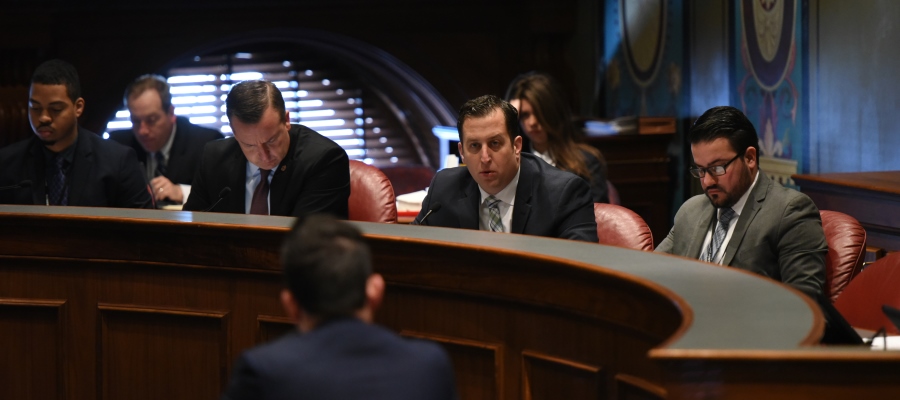- Details
- Category: Press Releases
ORLAND HILLS — To honor local veterans State Senator Michael E. Hastings is partnering with Orland Hills Mayor Kyle Hastings to host a free Veterans Breakfast from 9 to 11 a.m. Saturday, June 23 at the Orland Hills Recreation Center (16553 Haven Avenue, Orland Hills).

- Details
- Category: Press Releases
 TINLEY PARK – Credit reporting agencies will no longer allow consumer reporting agencies to impose a charge on a consumer for placing a freeze, removing a freeze, or temporarily lifting a freeze on their credit reports, thanks to a new law championed by State Senator Michael E. Hastings (D-Tinley Park).
TINLEY PARK – Credit reporting agencies will no longer allow consumer reporting agencies to impose a charge on a consumer for placing a freeze, removing a freeze, or temporarily lifting a freeze on their credit reports, thanks to a new law championed by State Senator Michael E. Hastings (D-Tinley Park).
Hastings pushed for safeguards after Equifax announced that a security breach compromised the personal information of 143 million U.S. residents, including more than 5.4 million Illinois residents.
Equifax originally disclosed the breach in September of 2017, but since then, there have been multiple disclosures from the company that show more vital information was stolen than the company originally revealed. Just last month, Equifax informed the public that a small number of passport images and information were stolen as part of the security breach, despite previously denying such a thing occurred.
“More than 5.4 million Illinois residents do not know who may have access to their personal information and what they might do with it,” Hastings said. “This new law will allow consumers to protect themselves in a cost-effective and timely manner.”
In the original report released to the U.S. Senate Banking Committee, Equifax admitted that the security breach compromised information such as names, Social Security numbers, birth dates, addresses and driver's license numbers. This breach is very concerning, as such sensitive information can be used for identity theft and fraud.
House Bill 4095 will prohibit credit reporting agencies from imposing a charge on a consumer for placing a freeze, removing a freeze, or temporarily lifting a freeze on their credit reports.
Previously, consumer reporting agencies were allowed to charge up to $10 each time a consumer wished to take these proactive actions.
House Bill 4095 will not only eliminate fees but would also allow Illinois residents to initiate or remove a freeze by telephone and through electronic methods.
“This commonsense law is long overdue,” Hastings said. “We live in a global economy. Modern business structures require large and small companies to provide online services to store a consumer’s personal and sensitive data. Our information is stored in clouds and databases regardless of our approval. This makes it easier for dangerous individuals to hack and distribute this information to bad actors. This new law will ensure there are safeguards in place to protect Illinois citizens when misfortune strikes.”
House Bill 4095 goes into effect immediately.
- Details
- Category: Press Releases
 RICHTON PARK — State Senator Michael E. Hastings (D-Tinley Park) is hosting a free community Touch-A-Truck event from 11 a.m. to 3 p.m. Saturday, June 23.
RICHTON PARK — State Senator Michael E. Hastings (D-Tinley Park) is hosting a free community Touch-A-Truck event from 11 a.m. to 3 p.m. Saturday, June 23.
The event will allow children and their families the opportunity to touch, sit in and explore real vehicles from a number of different trades.
There will be a wide variety of vehicles such as a fire truck from the Richton Park Fire Department, a semi-truck from Prairie State College, a SWAT truck from the South Suburban Emergency Response Team, a PACE Bus, an industrial crane from Mi-Jack and a tractor from the Farm Bureau and more.
The family-friendly event is open to local residents.
Date: Saturday, June 23
Time: 11 a.m. to 3 p.m.
Location: Rich South High School (5000 Sauk Trail, Richton Park)
For more information, call Hastings’ office at (815) 464-5431.
- Details
- Category: Press Releases
 CHICAGO— Illinois now has a bipartisan budget in place, thanks to support from State Senator Michael E. Hastings.
CHICAGO— Illinois now has a bipartisan budget in place, thanks to support from State Senator Michael E. Hastings.
The balanced budget invests $38.5 billion in working- and middle-class families across the state and was signed into law Monday morning.
“This bipartisan budget prioritizes the working families across the south suburbs by providing stability, certainty and predictability to area residents,” Hastings said. “This budget saves programs for the most vulnerable that were on the governor’s chopping block and increases funding for our highest-need schools. That’s a win for Illinois.”
The budget includes a $25 million increase for higher education, $350 more in K-12 education funding and $120 million in revenue dedicated to local governments. The state’s group health insurance program is also fully funded.
The budget also includes funding for AIM HIGH, a new and innovative tuition assistance grant program that is aimed at attracting Illinois students from middle class families to state universities.
“The most important investment we can make as a state is in providing our children the best educational opportunities to flourish,” Hastings said. “Properly funding higher education, K-12 and early education puts our children on a pathway to success. Our state has first-class higher education facilities in our own back yard and this commonsense grant program will allow Illinois’ best and brightest to take utilize them.”
House Bill 109 passed the Senate and House with bipartisan support.
More Articles …
Page 52 of 89


